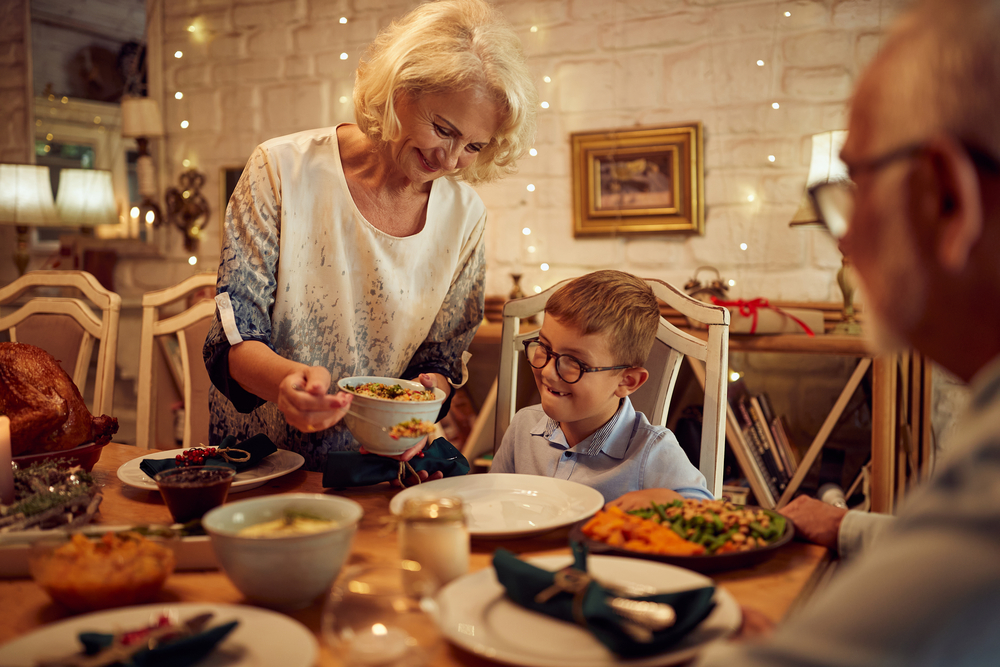
Mindful in the Moment: Three Tips for Being Present During Holiday Meals
Trevor Hamlett, MPH, CPT
Health Educator
During this holiday season, I have learned the true meaning of family and sacrifice having taken on the role of a caregiver for a family member recovering from surgery. As expected, he hasn’t had much of an appetite. I work as a clinical dietitian and am studying for my registered dietitian exam; so I am determined to make sure he has adequate nutrition. One of the most beautiful moments was in the wee hours of the morning when he asked me to “sit down and have a slice of pie.” We sat there, present in the moment, having a heart-to-heart for hours. We became closer than ever before. As we shared pie and stories of past experiences, there were smiles and laughs, and for a brief moment, his pain seemed to be an afterthought.
As many families gather during the holiday season, “eating less” can be a common topic of discussion. As a clinical dietitian, I encourage you to focus on creating a culture of mindful eating with family instead. Family may mean blood relatives, close friends, and social groups. Many factors such as age, medication, and medical conditions can all decrease appetite, but sharing meals with family is a great way to bond with loved ones, increase appetite, and get adequate nutrition. Eating with family is also great for

helping children expand their palettes, build their self-esteem, and create healthier eating habits which in turn helps the whole family with weight management. A PubMed article suggests that hosting company at mealtimes is a great strategy to help older adults improve appetite and adequacy of diet.
Some folks don’t have company to invite over to share a meal. Many areas of North Carolina have congregate meal sites, which are community sites where adults can go to share a meal with others. Congregate meal sites can provide adults aged 60 and older with a nutritious meal that meets one third of the recommended daily dietary allowance. These sites can also encourage social engagement, spread information on resources and healthy education, and create meaningful volunteer opportunities. Find a local congregate meal site here.
Instead of focusing on curbing your appetite, spend your valuable family mealtime mindfully. Here are 3 mindful eating tips that I challenge you to try this holiday season!
Active Tasting: Foods come from a variety of cultures and have countless tastes and textures. Practice what I call “active tasting”: Ask yourself, is the food sweet, salty, sour, bitter, or umami (savory)? How would you describe the texture of the food? Does the food melt in your mouth when you eat it? To take active tasting a step further, try to identify the different herbs, spices, and other seasonings that were used to prepare the food. Ask a family member what tastes and textures they note. You may be surprised to find that their experience is different from yours!
Practice Gratitude: Honor your food, who made it, and where it came from. Foods often have rich histories and traditions. One of my favorite holiday sides, collard greens, has lineages dating back to the era of colonialism and slavery. My grandma’s collard green recipe was passed down to me through generations of retelling the recipe out loud. Each time I prepare it, I try to give gratitude not only for the fiber and Vitamin A it provides but also for the holiday memories that I associate with the greens.

Limit Distractions: During the holidays, there are many exciting sports events and movies on TV. Trust me; as an avid sports fan I know it’s tempting to scarf down my food and watch the games. However, I try to remind myself of the knowledge and wisdom I gain from conversations with family and friends during the holidays. I don’t see my family nearly as I used to, so these times are even more important. As I’ve grown older, I’ve come to appreciate my family’s tradition of taking a break from the screens and eating holiday meals at the dining room table. My family also has a tradition of saying grace which, in combination with meditation, helps me quiet mental noise and be present in the moment.
At the Poe Center, we promote and value sitting down, having a meal, and talking with each other. Eating together is a key part of our nutrition programs such as Cook Well, Eat Well where participants cook and share a healthy meal. As we eat, we talk about the taste, our feelings towards the dish, healthy alternatives, and how we would prepare the meal differently. This holiday practice mindful eating and share the gift of being present!

Featured Poe Program: Food for Thought
Participants: 4th-5th grade
Have your students ever asked… Why do we need food? What is “MyPlate”? What are the different food groups, and do I need to eat foods from all of them? How does media influence food choices? Are all body types the same? Is dieting healthy? If you said yes to any of these questions, don’t give it a second thought; sign up for this program today. The session will answer each of these questions and more.

Sources:
Boston, 677 Huntington Avenue, and Ma 02115 +1495‑1000. “Mindful Eating.” The Nutrition Source, 14 Sept. 2020, https://www.hsph.harvard.edu/nutritionsource/mindful-eating/
Davis, Edward H., and John T. Morgan. “Collards in North Carolina.” Southeastern Geographer, vol. 45, no. 1, 2005, pp. 67–82, https://www.academia.edu/68183766/_Collards_in_North_Carolina_.
Stanford Medicine Children’s Health – Whay the Family Meal Is Important.
NC DHHS – Nutrition-Congregate and Home Delivered Meals.
Pilgrim, Anna, et al. “An Overview of Appetite Decline in Older People.” Nursing Older People, vol. 27, no. 5, June 2015, pp. 29–35, https://doi.org/10.7748/nop.27.5.29.e697.
